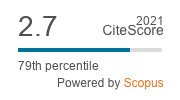Global asymptotic stability of an umploment model using geometric approach
Keywords:
Unemployment model; Nonlinear employment rate; Global stability; Geometric approachAbstract
In this work, we study the global asymptotic stability of a nonlinear unemployment model. The nonlinearity comes from the matching process between vacancies and unemployed people. Thus, we assume that the employment rate is a general nonlinear function, which includes the bilinear form presented in the previous scientific research. We provide conditions that guarantee the existence and
uniqueness of a positive equilibrium. To study the dynamic behavior of this equilibrium, we propose Li’s geometrical approach. This technique ensures global asymptotic stability without the need to impose an additional condition. Finally, we provide numerical illustrations of our study.
References
Albrecht. J. W and Axell. B, An Equilibrium Model of Search Unemployment, Journal of Political Economy, The University of Chicago Press. 92 (5), (1984), 824–840.
Daud. A. A. M, and Ghozali.A. W, Stability analysis of a simple mathematical model for unemployment, Caspian Journal of Applied Sciences Research, 4 (2), (2015), 15–18.
Mortensen. D. T, Equilibrium Unemployment Dynamics, International Economic Review, 40 (4), Special Issue on Search, Matching and Related Topics, Published by Wiley, (1999), 889–914.
Pissarides. C. A, Equilibrium unemployment theory, (2nd edition), The MIT Press Cambridge, Massachusetts London, England, (2000).
Pissarides. C. A, Equilibrium Unemployment Theory, Oxford: Blackwell, (1990).
Pissarides. C. A, Unemployment and Vacancies in Britain, Economic Policy, 3, (1986), 473–478.
Munoli. S. B, and Gani.S, Optimal control analysis of a mathematical model for unemployment. Optimal Control Applications and Methods, 37 (4), (2015), 798–806.
Al-Maalwi. R. M., Ashi. H. A, and Al-sheikh. S, Unemployment Model, Applied Mathematical Sciences, 12 (21), (2018), 989–1006.
Petaratip. T, and Niamsup. P, Stability analysis of an unemployment model with time delay, AIMS Mathematics, 6 (7), 7421–7440.
Capasso.V, Serio. G, A generalization of Kermack-Mckendrick deterministic epidemic model, Math. Biosci, 42, (1978), 41–61.
Zhange. T, Neng. X, and Zhang. T, Global Dynamics of a Virus Dynamical Model with Cell-to-Cell Transmission and Cure Rate, International Journal of Statistics and Systems, (2015), 1–8.
Eckalbar. J. C, and Eckalbar. W. L, Dynamics of an epidemic model with quadratic treatment, Nonlinear Analysis: Real World Applications, 12 (1), (2011), 320–332.
Martin, R, Logarithmic norms and projections applied to linear differential systems, J. Math. Anal. Appl., 45 (1974), pp. 432–454.
El Fadily. S, Kaddar. A, A delayed model of umployment with a General Nonlinear Recrutment Rate, Journal of Matimatical and Computational Science, (2022), 12–21.
Kaddar. A, Abta. A, Talibi Alaoui. H, Global stability for delay SIR and SEIR epidemic models with saturated incidence rates, Electronic Journal of Diferential Equations, 2012 (23), (2012), 1–13.
Kuang. Y, Delay Differential Equations with Applications in Population Dynamics, Academic Press, New York, (1993).
Downloads
Published
Versions
- 2023-10-10 (4)
- 2023-07-27 (3)
- 2023-07-27 (2)
- 2023-07-18 (1)




